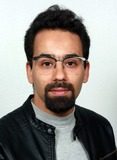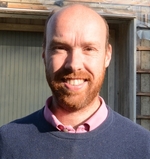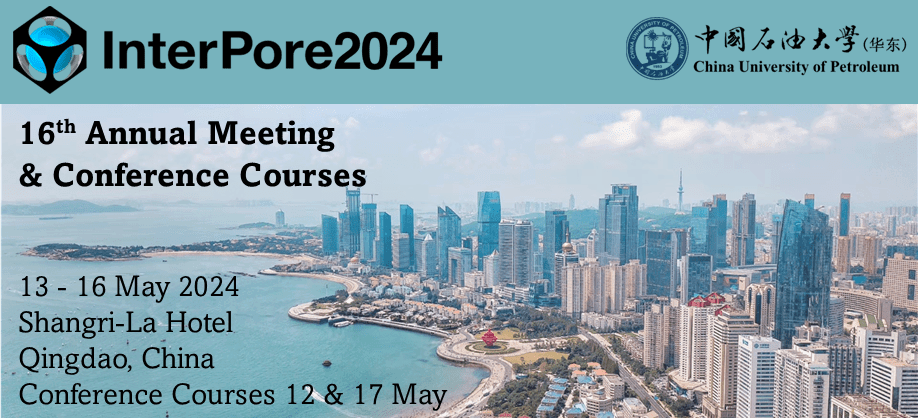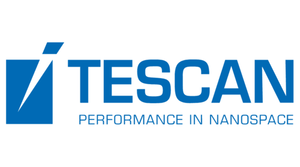Participation in the conference courses is in-person only (online participation is not possible.) Registration for conference courses can be made in conjunction with your conference registration. If you would like to register for a conference course but will not be attending InterPore2024, or if you have already registered and wish to update your registration, please contact margaret.dieter@interpore.org to obtain a registration form.
CONFERENCE COURSE #1: Multiphase Flow in Permeable Media: A Pore-Scale Perspective - Instructor: Martin Blunt | Friday, 17 May | Time: 9:00 - 17:00 | Location: Xihuan 105 (西环105)
CONFERENCE COURSE #2: Capillarity in Porous Media at Different Scales - Instructor: Majid Hassanizadeh | Sunday, 12 May | Time: 9:00 - 12:00 | Location: Xihuan 101 (西环101)
CONFERENCE COURSE #3: Microscale flow and multiphysical transport in porous media (In Chinese) - Instructor: Moran Wang | Sunday, 12 May | Time: 9:00 - 17:00 | Location: Xihuan 201 (西环201)
CONFERENCE COURSE #4: Utilization of pyGeochemCalc for geochemical thermodynamic calculations - Instructor: Dapo Awolayo | Friday, 17 May | Time: 14:00 - 17:00 Due to unforseen circumstances, this course has been cancelled.
CONFERENCE COURSE #5: Introduction to powder metallurgically manufactured porous materials - Instructor: Olaf Andersen | Friday, 17 May | Time: 9:00 - 12:00 | Location: Xihuan 201 (西环201)
CONFERENCE COURSE #6: Multi-Scale Multi-Modal Correlative Analysis including image Analysis (CT/FIB/Avizo - Hands On Tutorial) - Instructor: Eric Pui-Lam Ho | Sunday, 12 May | Time: 14:00 - 17:00 | Location: Xihuan 104 (西环104)
CONFERENCE COURSE #7: Machine learning integration with pore-scale studies: concepts and applications - Instructor: Saeid Sadeghnejad | Sunday, 12 May | Time: 9:00 - 12:00 | Location: Xihuan 102 (西环102)
CONFERENCE COURSE #8: Advances in CO2 Sequestration in Reactive Basaltic Rocks through Mineral Carbonation - Instructor: Helge Hellevang, Mohammad Nooraiepour & Mohammad Masoudi | Friday, 17 May | Time: 9:00 - 12:00 | Location: Xihuan 105 (西环202)
CONFERENCE COURSE #1
Multiphase Flow in Permeable Media: A Pore-Scale Perspective
Instructor:
 Martin Blunt Imperial College London UK |
Event Date: Friday, 17 May 2024
Time: 9:00 - 17:00 (2-hour lunch break)
Duration: Full-day
Location: Xihuan 105 (西环105), China University of Petroleum (UPC), Qingdao (Transportation from the Shangri-La will be provided.)
Registration Fee: €150 (For InterPore2024 Participants) / €220 (Conference Course only)
Description:
This course will provide an in-depth description of multiphase flow in porous media with an emphasis on understanding pore-scale phenomena and their implications for storage and recovery processes. The course will start with a review of fundamentals, including wettability, capillarity and multiphase flow, so that the basic physical laws governing flow and transport – at the small scale – are properly understood. Then the latest developments in imaging and modelling technology will be reviewed. Attendees will be taught how to apply a knowledge of pore-scale processes to predict flow and trapping with a wide range of applications.
Course Topics:
• Recap of the fundamentals: wettability, capillary pressure, Darcy’s law, relative permeability and conservation equations
• Imaging and pore-scale experiments
• Displacement processes and link to wettability and multiphase flow.
• Three-phase flow
• Implications for flow and trapping: design of recovery and storage processes
CONFERENCE COURSE #2
Capillarity in Porous Media at Different Scales
Instructor:
 Majid Hassanizadeh |
Event Date: Sunday, 12 May 2024
Time: Morning
Duration: 9:00 - 12:00
Location: Xihuan 101 (西环101), China University of Petroleum (UPC), Qingdao (Transportation from the Shangri-La will be provided.)
Registration Fee: €75 (For InterPore2024 Participants) / €110 (Conference Course only)
Description:
This conference course will provide highlights on the topic of “Capillarity in Porous Media at Different Scales.” In the course, a systematic approach is taken to the understanding of capillarity in porous media at different scales. Current definitions of capillary pressure, which are mostly empirical in nature are revisited and it is shown that they are special cases of a more general theory of capillarity. First, surface tension and its molecular basis and wettability concepts are introduced. Next, capillary pressure is defined at pore scale based on the equation of momentum conservation for a fluid-fluid interface. It is shown that, even at microscale, capillary pressure is equal to the difference in pressures of the two fluids only under static conditions. General equations for dynamic or non- equilibrium conditions are derived. Then, capillary pressure at the macroscale (Darcy scale) is introduced based on principles of thermodynamics, and its relationship to fluid pressures under static and dynamic conditions is explored. Non-equilibrium capillarity theory and its effects on the modelling of moisture transport and two-phase flow processes are discussed. Computational and experimental studies are presented that investigate new generalized equations in variety of systems.
Course Topics:
• Capillarity at pore scale
• Capillarity at macroscale; fundamentals
• Capillarity at macroscale; computational and experimental studies
CONFERENCE COURSE #3
Microscale flow and multiphysical transport in porous media (Chinese language)
Instructor:

Moran Wang
Tsinghua University, China
Event Date: Sunday, 12 May
Time: 9:00 - 17:00 (2-hour lunch break)
Duration: Full day
Location: Xihuan 201 (西环201), China University of Petroleum (UPC), Qingdao (Transportation from the Shangri-La will be provided.)
Registration Fee: €150 (For InterPore2024 Participants) / €220 (Conference Course only)
Description: InterPore China Chapter Committee provides this course in Chinese language during InterPore2024, which presents highlights on in-depth understanding of microscale flow and multiphysical transports in porous media, with an emphasis on microscale mechanisms and scale and coupling bridges. The course will start with a review of classical fundamentals, so that the basic physical laws governing flow and multiple transports – at different scales – will be properly understood. Consequently the latest developments in theories, experiments and multiscale modelling technologies will be presented. Attendees will learn how to apply the knowledge of microscale transport to predict behavior with a wide range of applications.
CONFERENCE COURSE #5
Introduction to powder metallurgically manufactured porous materials
Instructor:
.jpg)
Olaf Andersen
Fraunhofer Institute for Manufacturing Technology and Advanced Materials IFAM, Branch Lab Dresden, Germany
Event Date: Friday, 17 May
Time: 9:00 - 12:00
Duration: Half-day
Location: Xihuan 201 (西环201), China University of Petroleum (UPC), Qingdao (Transportation from the Shangri-La will be provided.)
Registration Fee: €75 (For InterPore2024 Participants) / €110 (Conference Course only)
Description: The course gives an overview on commercial and developmental porous metals that are manufactured by powder metallurgical methods. The manufacturing processes as well as key properties and applications are explained. Examples include materials for filtration, heat exchange and storage, medical implants as well as applications in hydrogen production and fuel cells.
CONFERENCE COURSE #6
Multi-Scale Multi-Modal Correlative Analysis including image Analysis (CT/FIB/Avizo - Hands On Tutorial)
Instructor:
 |
Eric Pui-Lam Ho |
Event Date: Sunday, 12 May
Time: 14:00 - 17:00
Duration: Half-day
Location: Xihuan 104 (西环104), China University of Petroleum (UPC), Qingdao (Transportation from the Shangri-La will be provided.)
Registration Fee: €75 (For InterPore2024 Participants) / €110 (Conference Course only)
Description: In the last decades, multi-scale 2D/3D/4D imaging techniques have developed rapidly and become increasingly appliable in porous material characterization. Many advanced imaging techniques, such as X-ray Computed Tomography (XCT), Electron Microscope Tomography (EMT), Laser Scanning Microscopy (LSM), Magnetic Resonance Imaging (MRI) and Scanning Transmission X-ray Microscopy (STXM), have been developing at a high speed both on the hardware and the software side. Furthermore, the increasing utilization and development of synchrotron, neutron and muon sources have provided excellent opportunities to advance the imaging techniques. Because of the development and their added value, they are intensively used to study porous media for their characterization and quantification as well as to study the various dynamic processes occurring inside porous media, providing unique perspectives in porous materials studies.
For this course, the attendees will be provided the most popular and powerful image processing and analysis software free of charge for 30 days. Avizo should be installed on the attendee laptops with the training licenses before the start of the course. During the course, the instructor will guide the attendees by using their computers to analysis a porous sample for porosity, permeability, and flow simulation.
Avizo is used to improve the quality of the image data and make the images more realistic by denoising and removing artifacts. The image data can not only be visualized in the 2D/3D/4D space but can also be accurately segmented by various technical before they are analyzed and quantified.
CONFERENCE COURSE #7
Machine learning integration with pore-scale studies: concepts and applications
Instructor:
 |
Saeid Sadeghnejad |
Event Date: Sunday, 12 May
Time: 9:00 - 12:00
Duration: Half-day
Location: Xihuan 102 (西环102), China University of Petroleum (UPC), Qingdao (Transportation from the Shangri-La will be provided.)
Registration Fee: €75 (For InterPore2024 Participants) / €110 (Conference Course only)
Description: This course investigates into the synergy between machine learning techniques and digital rock physics (DRP) workflow, offering a comprehensive exploration of concepts and applications. The fusion of deep learning methodologies with DRP not only enhances the efficiency of estimating porous media properties but also accelerates the process significantly. The implementation of deep learning is showcased across various applications at the pore scale, encompassing image segmentation (e.g., two-phase (pore-solid) or multimineral segmentation), rock property estimation (regression of single or multiphase properties), image resolution enhancement, and porous media reconstruction. Participants in this course not only gain proficiency in the DRP workflow but also acquire a thorough understanding of the diverse applications of machine learning within this framework. The curriculum spans a broad spectrum, ranging from pore-scale imaging through µ-CT scanning to predicting pore-scale properties using DRP. The course explores the latest advancements in pore-scale studies driven by deep learning methods, providing participants with insights into cutting-edge developments in the field. The course will be a combination of a presentation and hands-on exercises. Participants will be expected to bring a laptop for running deep-learning exercises. The course introduces participants to one of the well-established Python-based deep-learning libraries (i.e., Pytorch). By doing so, it empowers them with the tools necessary to implement machine learning techniques in the context of DRP. A preliminary knowledge of programming (any language) is necessary. In conclusion, the course not only imparts knowledge of the existing deep learning applications in pore-scale studies but also delves into potential future research avenues. Participants will gain insights into open areas that warrant further exploration, fostering a forward-looking perspective on the integration of machine learning with pore-scale studies.
CONFERENCE COURSE #8
Advances in CO2 Sequestration in Reactive Basaltic Rocks through Mineral Carbonation
Instructors:
 Mohammad Nooraiepour | %20(1).jpg) Mohammad Masoudi |  Helge Hellevang |
Event Date: Friday, 17 May
Time: 9:00 - 12:00
Duration: Half-day
Location: Xihuan 105 (西环202), China University of Petroleum (UPC), Qingdao (Transportation from the Shangri-La will be provided.)
Registration Fee: €75 (For InterPore2024 Participants) / €110 (Conference Course only)
Description: Explore the forefront of geological carbon storage (GCS) by delving into mineral carbonation in basaltic rocks, a highly promising technology that leverages the unique blend of characteristics in mafic and ultramafic rocks abundant in the Earth's crust. This workshop dives into the intricacies of this CO2 sequestration approach, which, in theory, could surpass anthropogenic CO2 emissions. Despite its vast potential, the full realization of this technology is hindered by a limited understanding of the underlying processes driving carbon mineralization. Drawing insights from industrial and pilot scale projects such as CarbFix in Iceland and Wallula in the USA, which involve injecting dissolved (CO2-acidified water) and supercritical CO2 into fractured basalts, has indicated that appropriate engineering can create conditions for effective carbon mineralization in basalt porous media. The success of these endeavors relies on achieving a sustained dissolution-precipitation geochemical reaction between the host rock and injected CO2. This intricate process involves a complex interplay of thermo-hydro-mechanical-chemical (THMC) mechanisms. The extent of the mineralization reaction within the reservoir hinges on the CO2-charged aqueous phase's ability to permeate and advance advection-diffusion-reaction within rock pore space, fracture network, and infiltrate surrounding matrix blocks. How fluid-rock systems interact, undergo changes, and induce dissolution-precipitation influences control over this reactive flow and solute transport. The reactions may either obstruct pores—retarding flow—or generate a network of cracks—promoting flow. Establishing an effective operation for CO2 mineralization necessitates harmonizing these THMC processes in matrix and fractures across various spatial and temporal scales, creating a positive feedback loop. This workshop thoroughly explores the fundamental scientific and engineering principles that pave the way for realizing the expansive potential of large-scale CO2 sequestration in basalt through carbon mineralization. We will scrutinize crucial facets of this unconventional CCS technology, recognizing its immense untapped potential for contributing to global emission reductions. Join us as we unravel the complexities and promise of this cutting-edge approach, propelling us toward a future of sustainable carbon management.




.jpg)
